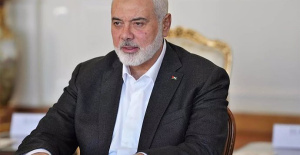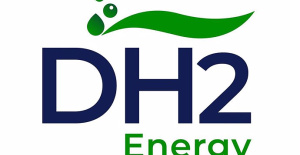Major powers avoid pointing fingers at Russia, though they do link the incident to the escalation in Ukraine
The explosion registered on Tuesday at a farm in Poland and the consequent death of two people has raised all the alerts in NATO, although for now the messages from the leaders of allied countries revolve around prudence. Neither the Polish government nor any major power has directly blamed Russia, beyond linking this dangerous incident to escalating attacks on neighboring Ukraine.
The Ukrainian war had already crossed borders in recent months, but never before had a projectile hit the territory of the Atlantic Alliance. The organization's statutes contemplate in its article 5 the collective defense clause, which involves all member states in the event of an attack against one of them, but Poland is currently considering invoking article 4 and opening consultations.
The Prime Minister of Poland, Mateusz Morawiecki, urgently summoned the security leadership, but late in the day he appealed for "calm" and "prudence" while waiting to clarify the origin of the projectiles that fell in Przewodow, near from the border with Ukraine, and that they have taken the lives of two people. Polish President Andrzej Duda admitted that there was no conclusive evidence.
Ukraine, on the other hand, did directly point to Russia through the mouths of its main officials, including the president, Volodimir Zelensky, who appealed for "action" after the "Russian missile attack." Not surprisingly, the incident was part of the largest wave of bombardments launched by Russia on Ukraine since the start of the invasion in February, with around a hundred missiles fired on Tuesday alone.
The Baltic countries also quickly joined the Ukrainian thesis pointing to Russia, but not the rest of the NATO members, who after an intense round of contacts both with Poland and among themselves have seemed to conclude that, at this point, there is no can infer nothing clear as to the authorship of the shots.
The incident has surprised part of the heads of State and Government of the Alliance in Bali, where the G20 summit has been held, and the meetings and calls have been constant this Wednesday. Common support for Ukraine and criticism of the Russian offensive, but prudence as to what it would mean to raise political tension to thresholds that had not yet been reached.
The president of the United States, Joe Biden, one of the first to speak to Warsaw when it was still early in the morning in Indonesia, has acknowledged that it is "improbable" that the projectile that fell in Poland was fired by Russia. "There is preliminary information that casts doubt on that," he said.
"Extremely prudent" has been shown by the President of France, Emmanuel Macron, who in his final appearance before the media at the G20 has acknowledged that the projectiles that fell on a day that, otherwise, still "cannot be attributed" to anyone it was "terrible" for Ukraine.
For his part, the German Chancellor, Olaf Scholz, has opted to "exhaustively clarify" how the explosion occurred, while the Prime Minister of the United Kingdom, Rishi Sunak, has advocated "establishing the facts" before going beyond, hours before a meeting of allied countries at the ambassadorial level.
The Italian Prime Minister, Giorgia Meloni, who has spoken with Morawiecki, has affirmed that it is time to "verify the facts and consider the next steps", although she has added: "It is a confirmation of the gravity and the consequences of the Russian aggression against Ukraine".
From Hungary, Prime Minister Viktor Orbán, the least belligerent EU leader with Moscow, has pointed out that it is time for "a calm and complete investigation." "One thing is certain: Hungary is firmly on Ukraine's side," he stressed, hours after speaking to his Polish counterpart.
RUSSIA DISMARKS
Moscow's version goes by alleging that everything is a "provocation" to escalate the conflict to a new level involving NATO. Former President Dimitri Medvedev, one of Russia's most belligerent leaders, has said on Twitter that the event in Poland proves that "the West is approaching a world war."
The Russian Ministry of Defense has affirmed this Tuesday that the projectile fallen on Polish soil corresponds to an S-300 anti-aircraft defense system launched by Ukraine.
The President of Turkey, Recep Tayyip Erdogan, one of the few who maintains relatively frequent contacts with Russia, has assured that he has no reason to distrust the arguments offered by Moscow in recent hours and has pointed from Bali to the possibility of "a technical error".
Apart from NATO, the Chinese government has once again dodged any signaling with a generic message, to "all parties", to act calmly" and "containment", in the words of the Chinese Foreign Ministry spokesperson, Mao None, according to official media.
APPEALS FROM kyiv
The G20 summit ended with a stronger message of support for Ukraine than expected, although it was not a joint statement given that Russia is still part of this group. Foreign Minister Sergei Lavrov left the summit on Tuesday night, so he has not responded 'in situ' about the incident in Poland.
In kyiv, however, everything indicates that the event, regardless of its circumstances, will serve to insist on the demands for greater support for its international partners, especially when the wave of attacks on Tuesday again caused fatalities and cuts in the electricity supply in large cities, including kyiv.
Defense Minister Oleksi Resnikov recalled that kyiv has been calling for a no-fly zone for months now, "because the sky has no borders", nor for "uncontrolled missiles". Several senior Ukrainian officials have also recalled that Ukraine's future depends on fully integrating into the EU and continuing to strengthen ties with NATO, from whose members it demands military support.

 Exploring Cardano: Inner Workings and Advantages of this Cryptocurrency
Exploring Cardano: Inner Workings and Advantages of this Cryptocurrency Seville.- Economy.- Innova.- STSA inaugurates its new painting and sealing hangar in San Pablo, for 18 million
Seville.- Economy.- Innova.- STSA inaugurates its new painting and sealing hangar in San Pablo, for 18 million Innova.- More than 300 volunteers join the Andalucía Compromiso Digital network in one month to facilitate access to ICT
Innova.- More than 300 volunteers join the Andalucía Compromiso Digital network in one month to facilitate access to ICT Innova.-AMP.- Ayesa acquires 51% of Sadiel, which will create new technological engineering products and expand markets
Innova.-AMP.- Ayesa acquires 51% of Sadiel, which will create new technological engineering products and expand markets Hamas views Israel's latest deal proposal in "positive spirit"
Hamas views Israel's latest deal proposal in "positive spirit" The Ibex 35 rises 0.22% mid-session driven by Aena (4.66) and Sabadell (4.57%)
The Ibex 35 rises 0.22% mid-session driven by Aena (4.66) and Sabadell (4.57%) STATEMENT: Selena Romero and Roberto Pérez winners of the 22nd Nacho Juncosa Memorial - International under-16 tennis tournament
STATEMENT: Selena Romero and Roberto Pérez winners of the 22nd Nacho Juncosa Memorial - International under-16 tennis tournament STATEMENT: DH2 Energy is the winner in the first European renewable hydrogen auction
STATEMENT: DH2 Energy is the winner in the first European renewable hydrogen auction How Blockchain in being used to shape the future
How Blockchain in being used to shape the future Not just BTC and ETH: Here Are Some More Interesting Coins Worth Focusing on
Not just BTC and ETH: Here Are Some More Interesting Coins Worth Focusing on UPV students design an app that helps improve the ventilation of homes in the face of high temperatures
UPV students design an app that helps improve the ventilation of homes in the face of high temperatures Ivace and promotes a less invasive device for the early detection of prostate cancer
Ivace and promotes a less invasive device for the early detection of prostate cancer Valencia unanimously approves the ordinance to allocate spaces to test innovative initiatives
Valencia unanimously approves the ordinance to allocate spaces to test innovative initiatives UPV researchers promote a paid master's degree as a "talent factory" in integrated photonics
UPV researchers promote a paid master's degree as a "talent factory" in integrated photonics A million people demonstrate in France against Macron's pension reform
A million people demonstrate in France against Macron's pension reform Russia launches several missiles against "critical infrastructure" in the city of Zaporizhia
Russia launches several missiles against "critical infrastructure" in the city of Zaporizhia A "procession" remembers the dead of the Calabria shipwreck as bodies continue to wash up on the shore
A "procession" remembers the dead of the Calabria shipwreck as bodies continue to wash up on the shore Prison sentences handed down for three prominent Hong Kong pro-democracy activists
Prison sentences handed down for three prominent Hong Kong pro-democracy activists ETH continues to leave trading platforms, Ethereum balance on exchanges lowest in 3 years
ETH continues to leave trading platforms, Ethereum balance on exchanges lowest in 3 years Investors invest $450 million in Consensys, Ethereum incubator now valued at $7 billion
Investors invest $450 million in Consensys, Ethereum incubator now valued at $7 billion Alchemy Integrates Ethereum L2 Product Starknet to Enhance Web3 Scalability at a Price 100x Lower Than L1 Fees
Alchemy Integrates Ethereum L2 Product Starknet to Enhance Web3 Scalability at a Price 100x Lower Than L1 Fees Mining Report: Bitcoin's Electricity Consumption Declines by 25% in Q1 2022
Mining Report: Bitcoin's Electricity Consumption Declines by 25% in Q1 2022 Oil-to-Bitcoin Mining Firm Crusoe Energy Systems Raised $505 Million
Oil-to-Bitcoin Mining Firm Crusoe Energy Systems Raised $505 Million Microbt reveals the latest Bitcoin mining rigs -- Machines produce up to 126 TH/s with custom 5nm chip design
Microbt reveals the latest Bitcoin mining rigs -- Machines produce up to 126 TH/s with custom 5nm chip design Bitcoin's Mining Difficulty Hits a Lifetime High, With More Than 90% of BTC Supply Issued
Bitcoin's Mining Difficulty Hits a Lifetime High, With More Than 90% of BTC Supply Issued The Biggest Movers are Near, EOS, and RUNE during Friday's Selloff
The Biggest Movers are Near, EOS, and RUNE during Friday's Selloff Global Markets Spooked by a Hawkish Fed and Covid, Stocks and Crypto Gain After Musk Buys Twitter
Global Markets Spooked by a Hawkish Fed and Covid, Stocks and Crypto Gain After Musk Buys Twitter Bitso to offset carbon emissions from the Trading Platform's ERC20, ETH, and BTC Transactions
Bitso to offset carbon emissions from the Trading Platform's ERC20, ETH, and BTC Transactions Draftkings Announces 2022 College Hoops NFT Selection for March Madness
Draftkings Announces 2022 College Hoops NFT Selection for March Madness























